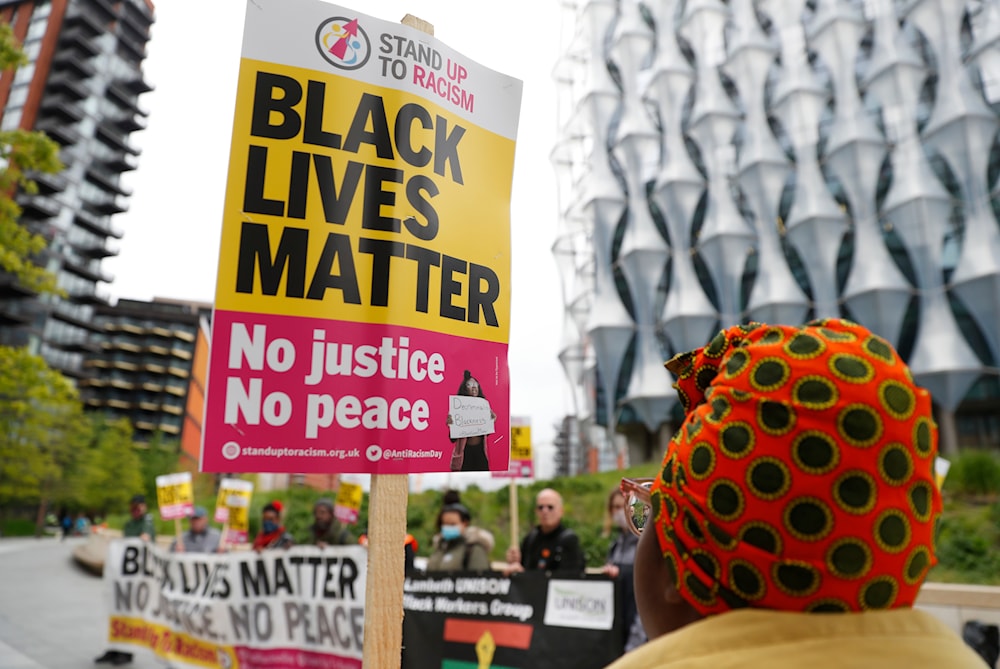UK MP demands inquiry into racist school labeling scandal
Kim Johnson urges Parliament to learn from past mistreatment of children in institutions during the 1960s and 70s.
-

People carry banners and placards during a demonstration organised by Stand Up To Racism, outside the United States Embassy in London, on Saturday, May 22, 2021. (AP)
A day before the parliamentary debate, The Guardian published a report spotlighting survivors, campaigners, legal experts, educators, and psychologists who testified in Parliament, exposing the profound and lasting impact of “systematic failure” on Black children and their families. Amid growing calls for justice, an MP has demanded a public inquiry into the historic scandal in which Black children were wrongly labeled as “educationally subnormal” and placed in institutions designed for students with physical and mental disabilities.
Kim Johnson, Labour MP for Liverpool Riverside, urged Keir Starmer to seek justice for survivors and expose the long-term consequences of this systemic failure in education.
Johnson expressed concern that the full extent of how many Black children were placed in “educationally subnormal” (ESN) schools in the 1960s and 70s remains unknown, with many never receiving the support they needed.
Speaking during a parliamentary debate on Wednesday, she stated that “many racist barriers still exist in education” and that they have “evolved directly from the policies and attitudes that drove the ESN scandal.”
“The closure of ESN schools in the 1980s directly led to a rapid expansion in the use of school exclusions,” Johnson explained, adding that this resulted in “higher numbers incarcerated in prisons, the expansion of the use of set and tiering in education whereby certain groups of children [in] increasing numbers are being denied the opportunity to sit exams at certain levels and then denied the opportunity to progress in educational settings, including going to university.”
Survivors reveal harrowing accounts of abuse and trauma
One survivor, Noel Gordon, told The Guardian that at six years old, an education department official visited his home and told his mother, “we found a special needs boarding school with a matron to keep an eye on him.”
“Then out of the blue he says I’m a dunce. Mum thinks: I’m only six, school will sort it out,” Gordon said. “What he was alluding to, they were placing me in a school for subnormal children. With no curriculum. This was government policy. They put two of my older brothers in the local special school. I suffered a catalogue of abuse from the age of six to 16. I was beat over the head at 12 in the playground and called a Black bastard by Christine, a member of staff, for no reason.”
Another survivor, Rene Stephens, 58, broke down in tears as he recounted the physical and sexual abuse he endured in the education system, along with the total lack of support.
“In my first year at Sir William Collins secondary school in Mornington Crescent, London, I was assaulted by the deputy head, Mr. Young. He, a martial arts expert, executed a slide kick that knocked me off my feet, causing me to land on my head and lose consciousness,” Stephens said. “Following this unprovoked attack, Mr. Young falsely accused me of assaulting him. The school’s response was to expel me. At the time, I had been living in a children’s home.”
Months later, he was sent to a Cotswolds boarding school where academic education was deprioritized in favor of woodwork and sports. “In my fourth year, I was sexually assaulted by a staff member named Trevor. Once again, this assault went unaddressed, leaving me to grapple with the trauma alone.”
Denise Davidson, who grew up in Jamaica, recalled her shock upon arriving in England and attending a special school. “None of the children in my very large school were sitting in a wheelchair. None of the children my age or older were wearing a baby’s bib. Yet here I was [in England] seeing my school friends in this situation,” she said, as quoted by The Guardian.
When her mother attempted to transfer her to a regular comprehensive school, she was met with resistance. “Denise is a lovely girl, and she is a credit to you. However, at this point, I think Denise should remain where she is because she is a cretin,” Davidson recalled being told. “I remember my parents returning home and my dad finding a dictionary and looking up the word cretin. My mum was sobbing at this point because she thought I had some disease.” She remained in the special school alongside disabled students.
Johnson told The Guardian that “the same fundamental systems that excluded Black children from mainstream education decades ago still exist today – just in different forms.”
While ESN schools have been shut down, she warned that Black children “are still disproportionately pushed into pupil referral units and alternative provision, feeding into the school-to-prison pipeline.”
She added that hearing survivors “speak at the event was a powerful reminder of the lasting impact of this injustice.”
However, Education Minister Catherine McKinnell stated that the government “doesn’t currently plan to establish a public inquiry” but remains committed to ensuring that “Britain is a country that will respect your contribution and will give you a fair chance to get on in life.”
Read next: UN Committee urges UK to combat hate speech, racism, and xenophobia

 5 Min Read
5 Min Read








